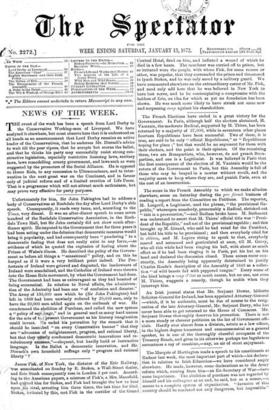Unfortunately for him, Sir John Pakington had to address a
'body of Conservatives at Rochdale the day after Lord Derby's able speech. Consequently, it reads very tame, and, according to the Times, very dismal. It was an after-dinner speech to some seven hundred of the Rochdale Conservative Association, in the Roch- dale Town Hall, but Sir John certainly did not show much after- dinner spirit. He imputed to the Government that for three years it had been acting under the delusion that democratic measures would bring it popularity, and had consequently been " pandering " to a democratic feeling that does not really exist in any force,—as evidence of which he quoted the explosion of feeling about the Prince of Wales's illness. He described the policy of the Govern- ment as before all things a "sensational" policy, and on this he harped as if it were a very brilliant point indeed. The Pro- testants of Ireland were grieved and disgusted, the landowners of Ireland were scandalized, and the Catholics of Ireland were thrown into the Home Rule movement, by what the Government had done. 'The Government had been as extravagant as they had boasted of -being economical. In relation to Naval affairs, the administra- tion of the Admiralty had been one "of confusion and disaster." The Army of 130,000 men which he (Sir John Pakington) had left in 1868 had been unwisely reduced by 20,000 men, only to have the 20,000 men added again on the outbreak of war. He oomdemned the abolition of Purchase, and called the new system -a
"policy of espkilage," and in general used as many hard names (or the acts of t1.4 Preeent Government as his literary imagination -could invent. Re ended his peroration by the remark that it should be inscribed "on every Conservative banner" that they are "advocates of enlightenment, progress, and rational liberty, but that they terly condemned democratic innovations and re- volutionary ainesses,"—eloquent, but hardly lucid or instructive language. Is the Ballot a democratic innovation, and Mr. Disraeli's own household suffrage only "progress and rational liberty"?


































